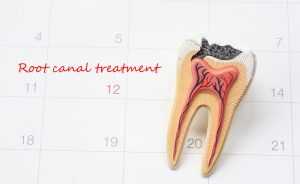For decades, one of the most dreaded dental procedures had been the root canal. Modern dental technology has taken the pain out of the process, however, the procedure remains relatively the same. Root canal treatment s attempt to save a seriously damaged or infected tooth. A root canal surgery involves removing the damaged area of the tooth, known as the pulp, then cleaning and disinfecting the area followed by filling and sealing. Damaged teeth that require root canal intervention are teeth that are cracked, or those that have developed a deep cavity caused by an infection.
There are a number of considerations when your dentist tells you that you need to undergo root canal surgery. Know that you are not alone. More than 15 million root canals are performed in the United States every year, or about 41,000 per day. The first thought is what does the procedure entail? There are a number of steps involved after the diagnosis which will be carried out over several office visits. First, there will be dental x-rays taken to target the tooth where decay is present. During the actual procedure, local anesthesia is administered by injection to the affected tooth. The area will be numbed prior to this, so those who are needle-phobic, have no cause for concern. In truth, today’s root canals are no more painful than having a filling. The next step is the Pulpectomy, where an opening is made in the tooth, and the infected or diseased pulp is removed. Finally, roots that have been exposed are filled with a gutta-percha. This is latex extracted from certain Malaysian trees. The latex is combined with rubber and is now used chiefly in dentistry and for electrical insulation. On average, a root canal on a back molar, for those without dental insurance, averages about $1,000 – $1,300.
The True Average Cost for a Root Canal Treatment
What some patients may not realize is that in addition to the root canal procedure there will be additional postoperative restoration work -a post and a crown. Posts and crowns are recommended when the dental cavity had been large. When a dental crown is recommended, it is usually preceded by the insertion of a dental post and core. The post and core procedure is advised when more than half of a tooth’s original crown has been lost. Inserting a post will assist to anchor the core to the tooth and provide a solid foundation for a permanent crown. When more of the original crown has been preserved, a core is recommended over a post. According to Medigo.us, the average cost for a post and/or core procedure is about $450.
For the crown, the specialist injects anesthesia as before. Next, dental impressions are taken of the upper and lower dental arches. These impressions will serve as a mold used by a dental laboratory to make the crown. A second impression is taken to fabricate a temporary crown. This is carried out in the office during the procedure so the patient leaves with the temporary serving as a placeholder until the dental laboratory has crafted the permanent crown. Also during this visit, the dentist or dental surgeon will use a shade guide held against the teeth to determine which shade is best to blend well with the rest of the teeth. When the permanent crown is installed, it is cemented in place. This crown mimics the entire top of a tooth with a hollow space inside. It is designed to fit the tooth securely keeping bacteria out. The final step is to take a final impression to tweak the crown and make any adjustments to ensure patient comfort and crown durability. On average, the dental crown procedure costs between $600 to $1,500 per tooth.
How to Make Root Canal Treatments More Affordable
If you have dental insurance through your employer, you might be unpleasantly surprised to learn that dental procedures performed by a specialist such as an endodontist, are not covered expenses. Nor is the restorative work, either. As one tallies the cost for these procedures, it becomes evident that while a root canal procedure can be physically painless, it may be a painfully expensive experience. One of the best ways for those without dental insurance through their employer, is to select among the available EDP Dental Plans. While not dental insurance, EDP Dental Plans’ practitioners offer discounts of up to 60% off their standard office fees and savings of 25% off the standard fee for procedures performed by a specialist.
There is an EDP plan tailored to the specific needs of singles, couples and families. Many members report that the annual membership fee is realized during their very first visit to their dentist or dental specialist as members of EDP Dental Plans. Membership may be paid in one sum or divided into monthly payments which makes quality dental care affordable to everyone.
Additional benefits include no co-pays or waiting periods for treatment. There is no age limit nor a cap on the number of dental visits one can have during the year. EDP Dental Plans’ qualification criteria is stringent so we accept only those practitioners who meet our standards. With over 170, 000 medical practitioners nationwide, chances are the dentist you and your family use may already be a part of EDP Dental Plans’ network!
Coverage begins immediately, and the services of specialists including pediatric dentists, periodontists, prosthodontists, maxillofacial surgeons, endodontists, oral surgeons and orthodontists, are discounted as well. EDP provides a Sample Fee Schedule by zip code so members can readily see what they can expect to realize in savings. This is very helpful to those on a fixed income or with limited means.
EDP Dental Plans offers dental care solutions so that our members can more readily afford routine dental cleanings and checkups to preserve their overall good health. Procedures performed by dental specialists such as root canal treatments, are also discounted. EDP offers affordable dental plans starting as low as $99 per year, with instant activation. Find a participating dentist today and call 1.800.777.1085 or sign up online for immediate coverage.







